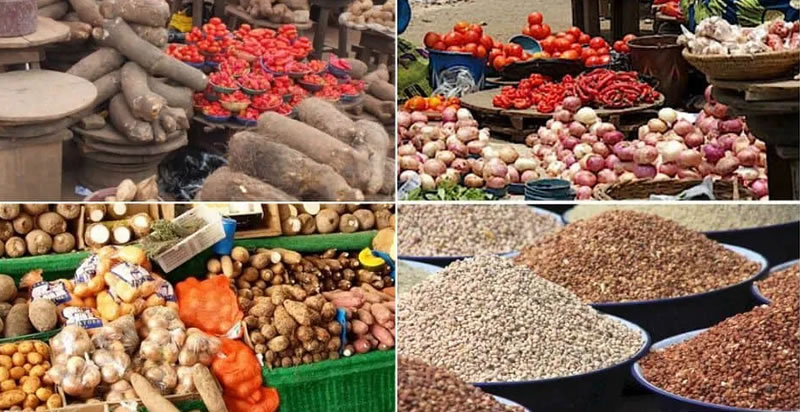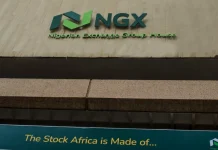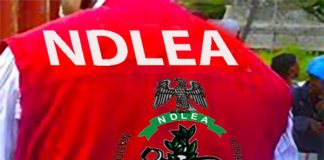🌿 Ruzu Non-Alcoholic Herbal Bitters
Ruzu Non-Alcoholic Herbal Bitters is a natural health supplement specially formulated to:
- ✅ Promote general wellness
- ✅ Detoxify the body
- ✅ Support the treatment of various ailments
Made from a powerful blend of 100% organic and medicinal herbs, Ruzu is completely alcohol-free, making it ideal for:
- 👪 All age groups
- 🌱 Health-conscious individuals
- 🌿 Anyone seeking non-alcoholic herbal remedies
Whether you're looking to boost your vitality, cleanse your system, or support healing the natural way, Ruzu Bitters offers a trusted herbal solution.
Many regions in the Northeast have seen a sharp decline in the cost of staple food crops, the first such decrease since the fuel subsidy was eliminated in 2023.
According to a recent News Agency of Nigeria (NAN) poll, the historically high food prices in Adamawa, Yobe, and Borno States saw a particularly noticeable drop in pricing.
The survey noted notable drops in the cost of beans, rice, guinea corn, and maize. For example, between October and November 2024, a 100kg bag of maize sold for ₦60,000 to ₦65,000 in Jimeta Market, Adamawa. Today, it sells for ₦40,000 to ₦45,000.
While a 100kg bag of beans has drastically decreased in price from ₦190,000 in 2024 to ₦95,000, a 100kg bag of local rice, which used to cost ₦60,000 to ₦65,000, is now selling for ₦45,000.
Cost Increases for Other Items
The cost of several goods has gone up, even while the price of food crops has generally decreased. The cost of 100 yams has increased from ₦70,000 to ₦80,000 to approximately ₦200,000 in Ganye Yam Market, Adamawa. Depending on size, individual tubers now sell for ₦2,000 to ₦2,500.
Likewise, the cost of livestock has increased throughout the area. The cost of cattle has gone up dramatically in Ngurore and Mubi throughout the last three years. The price of a cow has increased from ₦200,000 to ₦300,000 to ₦400,000 to ₦700,000, and some even reach ₦1 million.
Price reductions in Borno and Yobe
Yobe State has also seen a decrease in food prices. The price of a 100kg bag of unprocessed local rice has dropped from ₦57,000 to ₦60,000 to ₦40,000 to ₦43,000. Millet has dropped from 60,000 to 46,000, and beans have gone from 105,000 to 85,000. The price of other goods, such as pepper and groundnuts, has also decreased.
The cost of international rice has plummeted from ₦97,000 to ₦70,000 in Borno State, while local rice prices have declined from ₦80,000 to ₦65,000 to ₦64,000. A bag of maize used to cost ₦55,000, but now it costs ₦38,000.
In Borno, however, the cost of yams and beans is still high; a 100kg bag of beans now costs ₦100,000 (down from ₦180,000), while a single yam tuber costs ₦2,500 to ₦3,000.
The Price Drop’s Contributing Factors
Reduced purchases by Non-Governmental Organizations (NGOs), particularly following the termination of USAID’s humanitarian aid, are one of the major factors for food prices to decline. Demand has decreased as a result, which has had an impact on costs.
Demand was raised by NGOs purchasing food in bulk for areas hit by insurgencies. Price adjustments have now been made due to less purchases, according to public affairs specialist Lawan Mala.
More local production is also credited with the price drop, as more households adopt subsistence farming, which produces food for their own consumption and sells excess commodities.
Future Issues and Government Policies
According to Adamawa’s Agriculture Commissioner Prof. David Jatau, the state government’s initiatives to boost food production and increase food security are to blame for the price decline.
The Agricultural Programme for Poverty Alleviation and Climate Change Adaptation (APPACCA), which aims to boost productivity and guarantee food sufficiency, is one of the several projects the state has started under Governor Ahmadu Fintiri.
Read Also: NYSC Director-General Promises Prompt Payment of N77,000 Arrears
Still, there are worries that the high price of agricultural inputs like fertilizer may deter future agricultural investment.
Bean grower Sadiq Abubakar cautioned that while fertilizer costs can reach ₦50,000 per bag, the industry may lose money as food prices decline.
According to Muhammad Maitela, a food dealer and farmer, many locals are adjusting by buying food in bulk to store because costs have dropped, and many are turning to small-scale farming as a means of subsistence.
The federal government’s food importation policies, especially with regard to rice and maize, were praised by Prof. Ahmad Bawa, an expert in economic development at Modibbo Adama University, who also emphasized the significance of maintaining these policies in order to ensure food security.
However, because of the market’s instability, Bawa warned that if the situation is not controlled, prices may increase once more.
Prices can increase once more if the proper authorities don’t step in. He proposed the creation of direct farmer-to-consumer markets as a way to lower the influence of middlemen and stabilize prices.
















